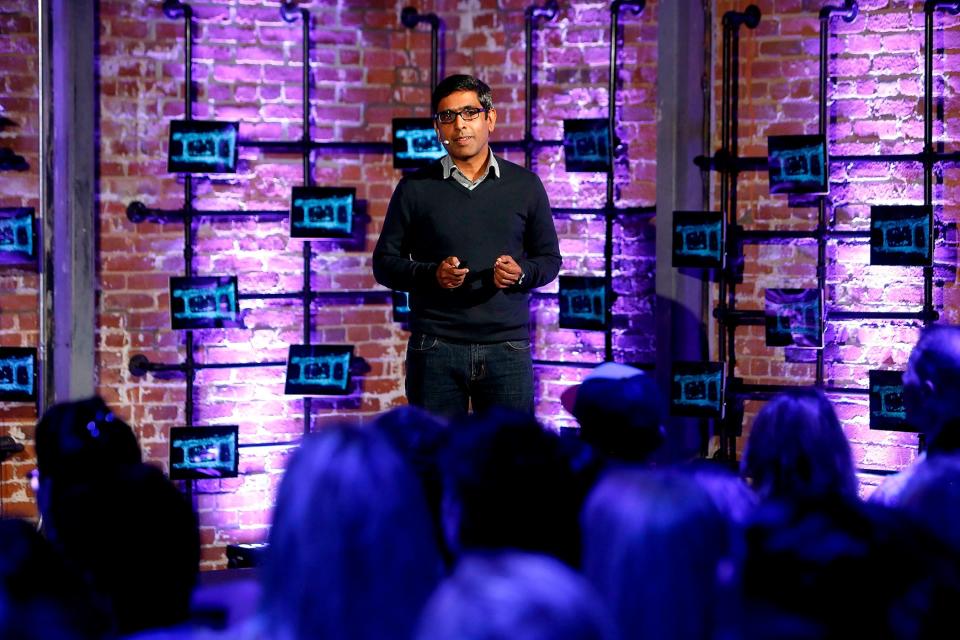A body-clock researcher explains why he never eats high-protein meals at night, and waits 1 hour to eat breakfast
A leading fasting researcher says he tries not to eat for at least 3 hours before bedtime.
He says he's managed to erase his own issues with acid reflux in this way, without using drugs.
Our gut slows down at night, and if we're fed protein, acid production kicks into high gear.
Scientist Satchidananda Panda has always been fascinated by what our bodies' internal clocks can do for us.
In 2002, he was part of a team that discovered mammals use a special blue-light-sensing protein, called melanopsin, to help regulate our circadian rhythms. This is the foundational science behind why we know it's good for our body to get out and see sunlight in the morning, dial down the brightness on our phones in bed at night, and let premature babies sleep in dimmed rooms, allowing them to grow faster, and get out of the hospital sooner.
But Panda never expected to find out that our body clocks are driven not just by when we see bright lights, but also when we feed ourselves. His more recent research suggests that our stomach and our liver don't operate the same way at night, and that eating super late or super early isn't a great idea.
"Your body is resting, needs that rest, and you're bringing food to wake him up," the professor of regulatory biology at the Salk Institute for Biological Studies told Business Insider.
Panda says if you're going to eat a protein-rich meal, make sure you time it so it's not too late after dark. Otherwise, your eating schedule can be the perfect recipe for acid reflux and sleep disturbance.
Cut protein after dark — or at least 3 hours before bed, Panda says

Research shows that late-night eating prompts the body to overproduce stomach acid. This is why Panda thinks it's important to eat an early dinner, when you can.
In the evening, he tries to stop eating at least three hours before bedtime. His habit is based on decades of his own research, on both mice and people, which suggests intermittent fasting can have a major positive impact on sleep quality, and also improve conditions like acid reflux.
"Between 8 and 9 p.m., our stomach actually becomes more sensitive to protein," he said.
After sunset, our gut slows down, and our salivary glands also get ready for bed, "to make sure that we don't drown in our own saliva," so it's a bad time to try to start digesting food, especially if it's protein-rich, Panda explained.
"Essentially, the food stays in your stomach, too much acid, nothing to neutralize," he said. He swears by his own strategy and says he's been able to stop taking acid reflux pills as a result of it.
This is advice some muscle-builders and other researchers disagree with — they say drinking protein shakes at night can help with muscle growth. Some dietitians also say a small snack before bedtime, like a smoothie or even a sleepy, tart cherry juice mocktail made with soda water, is nothing to worry about. The right snack may even aid sleep and muscle recovery.
But Panda shakes his head at the idea of having some chickpeas after dark, or other lean proteins. While bodybuilders might have other goals at the top of their stack, when it comes to improving gut health, he is confident his strategy is sound.
"If we eat a high protein load late in the night, then our stomach produces disproportionately more acid to digest that," Panda said.
This combination results in more acid sitting around in the stomach, with less liquid to neutralize it, creating the perfect environment for acid reflux to blossom.
"Look, your body has a rhythm," he said. "Even the healthy food at the wrong time is junk."
Wait an hour before breakfast to reduce the impact of cortisol and melatonin on digestion

On the other side of the clock, Panda recommends waiting at least an hour in the morning before eating breakfast.
When we wake up, our stress hormone cortisol is at its highest, and melatonin is also elevated. Both melatonin and cortisol make it harder for us to properly digest, in various ways.
"Melatonin actually inhibits pancreas function, so it slows down insulin release," he explained.
Eating within a 10-hour window can improve cholesterol and blood sugar, Panda says

He knows a time-restricted eating routine may sound challenging, but he says we have to learn to "optimize" our eating habits to fit our ancient biology into our modern ways.
"That extra time in the evening, that's the cradle of civilization," he said. "Staying awake late into the night is the key to create wealth, prosperity, and business."
In recent years, he's devised some new and experimental ways for shift workers to craft a timed eating plan that may minimize the harms of their carcinogenic, late-night work. In a recent study of 150 San Diego firefighters, he found that those who pushed their breakfast an hour or two later, and pushed dinner an hour or two forward — limiting their daily eating to a 10-hour window — had great results: improving their cholesterol, overall sense of wellbeing, as well as blood pressure, and blood sugar.
"Give yourself one to two hours before your first calorie," he said. "From there, you count 8, 9, 10, or maximum 12 because if you go beyond 12, that is within three hours of your bedtime. So that makes it relatively easy."
… Relatively.
Read the original article on Business Insider

